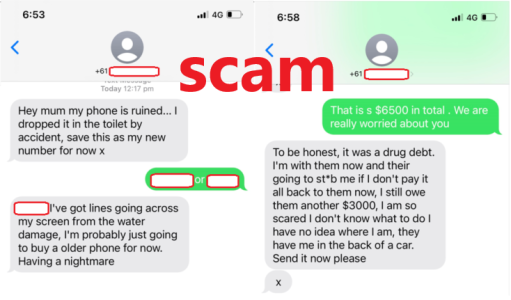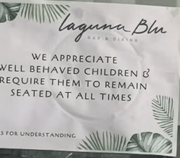Warning: Sophisticated text scam returns!
- Replies 15
If there’s one thing anyone can credit scammers for, it’s that they know their timing.
Unfortunately, that is, for everyone else going about their daily lives not defrauding people of their hard-earned money.
The recent weeks leading up to Christmas have seen authorities come out with warnings that criminals may take advantage of the holiday rush and try to catch people off guard to fleece their cash.
The government is now informing Aussies of the resurgence of a scam that parents and grandparents should especially watch out for: the ‘Hi Mum’ scam.
The scam involves someone pretending to be your child, claiming that they dropped their phones in the toilet or that people are holding them at knifepoint demanding they pay for a ‘drug debt’ worth thousands of dollars.
Sounds familiar? Well, that’s because it is!

The scam surfaced as far back as late July of this year, with users of WhatsApp reportedly being targeted.
In a related story, we posted in August, one couple lost almost $13,000 to this nasty technique. Several of our members also admitted to either receiving or falling victim to the scam.
And now, our very own Maddie shared that she received a similar message as well (the joke’s on the scammer though… read her warning why!).
An alarming detail she noticed was that the message she received was composed rather well, without the usual odd typos or bad grammar usually associated with sketchy texts or emails.
ScamWatch advises that parents who are recipients of these texts first verify the content by reaching their child by different means, such as a quick video call or through a number different from the one claiming to be related to them.
One couple was able to narrowly avoid becoming victims when their real son called just as they were about to transfer $4000 to the scammer.
Aussies are also encouraged to report the scams to the government here.

If ever you fall victim, immediately contact relevant authorities such as your bank and the police to find out what the next steps to take are.
Usually, it is recommended to change relevant access codes, especially in phishing scams that trick people into giving important account details through suspicious links.
You might also want to read up on other scams crooks might pull on you here, which include fake websites, fake deliveries, and sketchy investment scams.
As of November this year, $8.7 million has been lost to scammers.
In related news, there’s also a scam targeting myGov users making the rounds that involves an alleged income tax return being unable to be processed, so watch out for that too!
You can also stay updated for more news about tricky scams at our Scam Watch forum (you’re welcome to post if you have something to warn readers about!).
So, what is your reaction to this story? Have you, like Maddie, received a similar message recently? What did you do after?
Tell us your thoughts and experiences below!
Source: YouTube/9 News Australia
Unfortunately, that is, for everyone else going about their daily lives not defrauding people of their hard-earned money.
The recent weeks leading up to Christmas have seen authorities come out with warnings that criminals may take advantage of the holiday rush and try to catch people off guard to fleece their cash.
The government is now informing Aussies of the resurgence of a scam that parents and grandparents should especially watch out for: the ‘Hi Mum’ scam.
The scam involves someone pretending to be your child, claiming that they dropped their phones in the toilet or that people are holding them at knifepoint demanding they pay for a ‘drug debt’ worth thousands of dollars.
Sounds familiar? Well, that’s because it is!

The government is warning Aussies about a scam that surfaced earlier this year. Image Credit: Twitter/@Scamwatch_gov
The scam surfaced as far back as late July of this year, with users of WhatsApp reportedly being targeted.
In a related story, we posted in August, one couple lost almost $13,000 to this nasty technique. Several of our members also admitted to either receiving or falling victim to the scam.
And now, our very own Maddie shared that she received a similar message as well (the joke’s on the scammer though… read her warning why!).
An alarming detail she noticed was that the message she received was composed rather well, without the usual odd typos or bad grammar usually associated with sketchy texts or emails.
ScamWatch advises that parents who are recipients of these texts first verify the content by reaching their child by different means, such as a quick video call or through a number different from the one claiming to be related to them.
One couple was able to narrowly avoid becoming victims when their real son called just as they were about to transfer $4000 to the scammer.
Aussies are also encouraged to report the scams to the government here.

If a message appears out of the blue asking you for anything, be it money or to update your details, it would be best to ignore it. Stock Image Credit: Pexels/Tyler Lastovich
If ever you fall victim, immediately contact relevant authorities such as your bank and the police to find out what the next steps to take are.
Usually, it is recommended to change relevant access codes, especially in phishing scams that trick people into giving important account details through suspicious links.
You might also want to read up on other scams crooks might pull on you here, which include fake websites, fake deliveries, and sketchy investment scams.
As of November this year, $8.7 million has been lost to scammers.
In related news, there’s also a scam targeting myGov users making the rounds that involves an alleged income tax return being unable to be processed, so watch out for that too!
You can also stay updated for more news about tricky scams at our Scam Watch forum (you’re welcome to post if you have something to warn readers about!).
So, what is your reaction to this story? Have you, like Maddie, received a similar message recently? What did you do after?
Tell us your thoughts and experiences below!
Source: YouTube/9 News Australia







